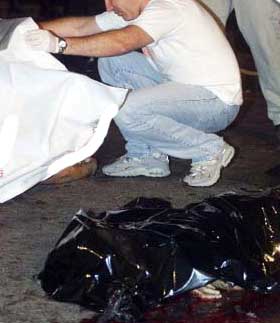
The critical thing about confronting evil is to call it by its rightful name. But
"All the evidence we have suggests that he was acting alone," said Cuomo. "The so-called 'Lone Wolf syndrome.'"
Lone wolf? That's a dangerous rhetorical mistake, made by a worried politician trying to avoid reality.
Saipov allegedly used a rental truck as a weapon of mass destruction on
"He seemed to have followed almost to a 'T' the instructions
Whether it happens again in
Saipov may have acted alone. But Cuomo is wrong in saying he's a lone wolf. A lone wolf is an outlier, a random creature, solitary, often a madman.
Saipov may have worked independently, but he wasn't autonomous. He's part of a pack, the
Their political ideology is that Islamic law must be imposed upon the world. And so it is this ideology -- not Islam -- that ultimately leads the radicalized, like Saipov, to mass murder.
Yes, Saipov is an immigrant and yes, he is Muslim, but here's what worries me: We don't need less immigrant Muslim assimilation in America, we need more. And we don't need more isolation, as has happened in
This encourages the Saipovs in America to cleave to Shariah supremacism. It leads to more Saipovs committing mass murder.
Americans are not willing to accept radical Islamic terror attacks on our streets as the new normal.
But is there a way forward?
Perhaps. If we change the way we think about the problem.
I cover politics, and for years in
The right craftsmen can hammer sentences into fences, and prevent rogue thoughts from entering and weakening partisan arguments.
So could it just be that our politics, or at least our rhetoric, prevents us from seeing a way forward here, to realize our fight is with Shariah supremacism, not Islam?
It will be difficult to convince the
It will also be difficult to convince
Each side insists the other is insane. And then comes Sayfullo Saipov, in that rented truck in
In response,
What Trump also wants is "extreme vetting" of Muslim immigrants. He tweets that "We must not allow
The problem isn't
"It is not
"Shariah supremacism is not a religion. It is a totalitarian political ideology with a religious veneer. This is the critical distinction -- ideology, not religion. If we cannot vet for Shariah supremacism because the political establishment decides it is not a political ideology but an Islamic religion entitled to all First Amendment protections, then we cannot protect the country. Period."
But how can the terms of a debate be changed, when
I'm reminded of an interview that I had a while back with
The dirty political secret is that
"I find this silence extremely painful," Ali told me. "It's been inculcated into them (the left) not to engage. ... They are afraid of being shunned. They're afraid of being put into a basket of deplorables. So they're silent."
But we can't afford that kind of silence any longer, can we?
Comment by clicking here.
John Kass is a columnist for the Chicago Tribune who also hosts a radio show on WLS-AM.


 Contact The Editor
Contact The Editor
 Articles By This Author
Articles By This Author